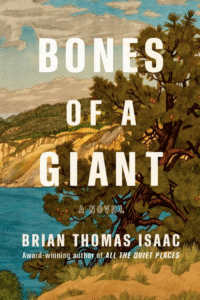Salmon River Valley, 1968
Rez life, loss and survival.
August 06th, 2025

Brian Thomas Isaac explores intergenerational trauma, survival and justice on the Rez.
“Honest in the bone, [the story] unfolds with the mastery of a wise, seasoned storyteller that your gut tells you has seen some bad stuff —an elder who knows that without deep, structural change, there’ll be more.”
Review by Trevor Carolan
BC Interior’s high plateau along Highway 97 from Vernon to Kamloops is unexpectedly beautiful. Its rolling hills, lakes, dry grasslands and vast blue skies are traditional cowboy country, although you can’t miss the summer and retirement homes springing up along the shorefronts. Drive half an hour out of Vernon into the Salmon River Valley and you reach Falkland, an old-time community of less than a thousand, but that swells with its rodeo in May. Those small-town buckaroos that Ian Tyson sang about are still here.
 In the late 1960s life in Falkland was simpler. On the Okanagan First Nation Reserve nearby where Bones of a Giant by Brian Thomas Isaac (Random House $35) plays out, it was simpler yet. In jerry-built homes without piped in water or electricity, and with Residential Schools still the norm for children most of the year, conditions off the grid on the Rez were as basic as it got in Canada. Mainstream sources pretty much ignored Indigenous communities back then; however, the writers Jeanette Armstrong, Ruby Slipperjack, George Clutesi and Richard Wagamese, among others, would provide readers with incisive writing on the subject, to which Brian Thomas Isaac from the Okanagan Reserve added barometric depth in 2021 with his acclaimed first novel All the Quiet Places (Touchwood). Its story of young Eddie Toma and daily life on the Rez there circa summer, 1968 depicted a culture in both remedial and long-term crisis that drew sparkling critical attention. Without reproach or invective, Isaac’s book demonstrated why a Reconciliation Movement was overdue.
In the late 1960s life in Falkland was simpler. On the Okanagan First Nation Reserve nearby where Bones of a Giant by Brian Thomas Isaac (Random House $35) plays out, it was simpler yet. In jerry-built homes without piped in water or electricity, and with Residential Schools still the norm for children most of the year, conditions off the grid on the Rez were as basic as it got in Canada. Mainstream sources pretty much ignored Indigenous communities back then; however, the writers Jeanette Armstrong, Ruby Slipperjack, George Clutesi and Richard Wagamese, among others, would provide readers with incisive writing on the subject, to which Brian Thomas Isaac from the Okanagan Reserve added barometric depth in 2021 with his acclaimed first novel All the Quiet Places (Touchwood). Its story of young Eddie Toma and daily life on the Rez there circa summer, 1968 depicted a culture in both remedial and long-term crisis that drew sparkling critical attention. Without reproach or invective, Isaac’s book demonstrated why a Reconciliation Movement was overdue.
It’s not necessary to read Isaac’s earlier book to appreciate Bones of a Giant, but after reading it you’ll want to. Isaac delivers with a calm, laidback voice, one we can trust. It’s a voice that emerges from the land, the territory you encounter upcountry in this province. Honest in the bone, it unfolds with the mastery of a wise, seasoned storyteller that your gut tells you has seen some bad stuff —an elder who knows that without deep, structural change, there’ll be more.
Lewis Toma, like his disappeared brother Eddie before him, has a hard time negotiating friendships at high-school. Embarrassed by the slapdash appearance of the “Indian” house he lives in with his mother, and by his uncle’s broken down cars around the property, he’s a loner—the sole Indigenous kid in Falkland’s public school. His mother, Grace, has been able to convince the white Indian Agent that governs their material life to keep him away from the Residential School as a chance to try and learn alongside white classmates, the summas, for his future. He’s a walking target for abuse and bullying there, a symbol of the whole larger culture’s systemic racism against Aboriginals.
Early on, bushwalking behind his bachelor Uncle Alphonse’s house, Lewis sees strangers shoot the lock off a keep-out fence, then trespass onto Reserve land. He partly overhears a plan, but doesn’t understand its aims; nervous, he retreats to a hollow-tree hiding place that his brother knew. Nearby, a giant cottonwood has toppled and crashed; the ragged branches look like the bones of a giant, he thinks. It’s his safe place, the only one besides his uncle’s home where he learns from Alphonse, and from his mother’s friend Isabel, the story of his own young life, and that of his missing brother. Eddie, we learn, vanished following a terrible accident that took the life of his girlfriend Eva, daughter of a white family from near the Rez. Two years later, everyone has an opinion about it. “I bet he saw her everywhere he looked and couldn’t stand it no more,” his old boss Hank says. Odds are that he headed for the river, is probably dead.
Grace, still-grieving, is a tough bush-mom abandoned by her shiftless husband, Jimmy, a drinker and womanizer. He’s the novel’s bad-luck sign that Grace can’t shake, even though a beating in pregnancy from him caused the stillborn death of her baby girl. Grace smokes roll-your-owns and harangues the Indian Agent to get plumbing and power funded for her house. With its veto power over fundamental life conditions, the corrosive control of the Indian Act is plainly evident. One alternative is for Reserve natives to earn independent summer cash packing fruit across the border in Washington. When Grace and Isabel leave to work, Lewis is left with relatives.
Life moves slowly on the Rez. Isaac spins a Book of Days recounting incidents familiar to any teenager, punctuated with period radio hits and a believable cast of Lewis’ friends and checkered characters. Uncle Alphonse delivers raw one-liners that would make a logger blush, and there’s the necessary summer teen romance and an unlikely intervention—all in prelude to a return of the devil himself. Jimmy’s back with a fast car, a hot flames paint-job and a plan. Trouble is knocking.
When the patriarchal language of the Indian Act ensures Grace’s family land tenure is vulnerable, existential conflict grows. At stake is a shaken world that needs rectifying. No spoiler alerts here: Isaac can put the ball over the plate and can handle the curve. If the narrative dynamics that made his first novel resound are not as pronounced, the resolution here makes sense in curious Rez fashion—as if the third in a uniquely-BC trilogy was already underway. 9781039011779
Trevor Carolan writes from North Vancouver.


Leave a Reply